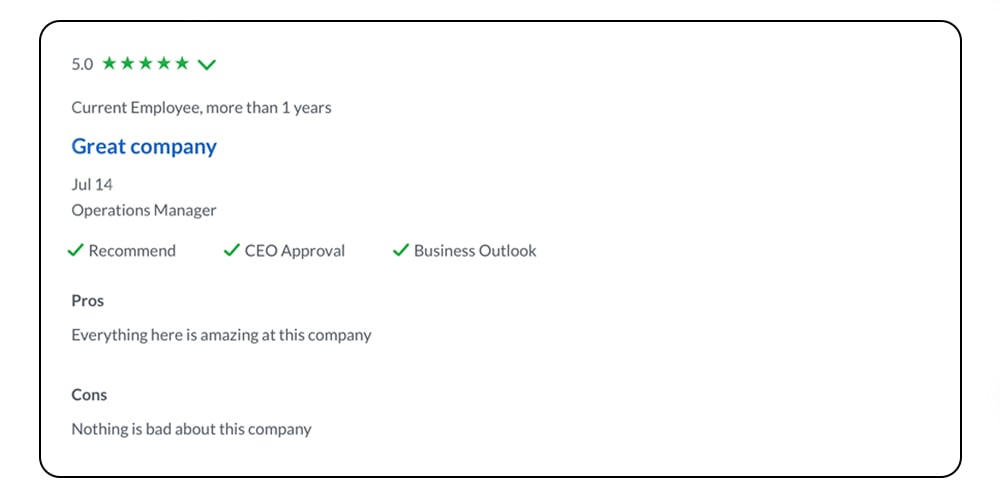 Most of us read reviews before we buy anything. After all, why not get feedback straight from people who’ve personally used what we’re looking to buy? So if you’re on the job search, why not seek out reviews for the same reasons? A career is, arguably, more important than whatever you’re about to buy anyway.
Most of us read reviews before we buy anything. After all, why not get feedback straight from people who’ve personally used what we’re looking to buy? So if you’re on the job search, why not seek out reviews for the same reasons? A career is, arguably, more important than whatever you’re about to buy anyway.
As an employer that’s been hiring people since 1955, we think reading reviews is an incredibly important step to take in your career search. While we aim to provide transparency every step of the way (which is why we have a library of articles just like this one), employers have been known to bend the truth. Reviews are a great way to sift through what’s real and what’s not.
But, just like an employer’s website promoting their great culture, benefits and whatever else they’re “the best” at, not every review can be trusted at face value. There are things you should look for before you trust a review — good or bad.
Keep reading to learn more about the five signs to look for when determining if you’re reading a trustworthy review — or, at the very least, one that’s relevant to you. You’ll also learn what to do with the information you read.
The Right Way to Read Reviews
As you research employers during your job search, you’ll likely spend some time on popular review websites — like Indeed, Glassdoor and Google. Because reviews are subjective and don’t always state something that’s explicitly true or false about an employer, it’s important to use what you read to form opinions of your own.
To form your own opinion, consider the following:
- Upset people are more likely to leave a review
- What does the review actually say?
- Is it relevant to you?
- What is the company’s response to the review?
- Does it sound too good to be true?
Upset People are More Likely to Leave a Review
Several studies over the past decade have found that people who had a bad experience have a higher likelihood of sharing their experience — including leaving reviews — compared to those who had a good experience.
That doesn’t mean a company should have overwhelmingly bad reviews. An overall rating of four stars out of five isn’t so bad, but a two out of five should raise some red flags for you.

What Does the Review Actually Say?
When reading reviews, it’s important to understand the context of what went right or wrong. If someone didn’t provide any context and only gave a star rating, it’s going to be hard to determine what worked or didn’t work. That means neither you nor the company can actually learn anything from it — and make the necessary changes to get better, if applicable.
If the review does say something, what does it say? Is it clearly a one-off situation that happened to upset this particular person or is it a sign of a larger issue at hand? How can you tell?
Sometimes, simply reading the review will tell you all you need to know about the situation. However, in many cases, it’s important to read other reviews to see if there’s a common theme.
Are almost all of the complaints about a poor work/life balance? If so, the company probably has a poor work/life balance. On the other end of the spectrum, does one person complain about the food served at lunch? Then, they’re probably just a picky eater.
Another thing to consider when reading the context of a review is whether it feels like the reviewer appears to have tried everything before resorting to leaving a review. For example, does it seem like they tried going to their manager (and their manager’s manager) before leaving a review? If so, that might be a sign of a company that’s not willing to listen.
Is It Relevant to You?
This might go without saying, but we’re going to say it anyway. Many reviews state the pros and cons of specific positions. If you see a large number of complaints that are specific to a certain position, is it a position you’re even interested in?
The company should certainly find ways to improve morale within that position, but if it’s not a position you’re interested in you shouldn’t be overly concerned about it. That said, if it’s the position you’re looking to apply for, it’s a good idea to keep digging and figure out what the comments and concerns are.
One other note before moving on from this point: Pay attention to whether the complaints are regarding the position at that company or whether the complaints are related to the duties of the job.
What we mean is, if you see people complaining that they’re on the phone all the time in a sales position, that’s probably not something that’s going to change by choosing a different company. Salespeople make a lot of phone calls. It’s what they do. If you don’t want to make a lot of calls, you might need to look at a different career rather than a different company.
Related: What is Cold Calling? [And How Does it Differ From Company to Company?]
What is the Company’s Response to the Review?
You could argue how the company responds to the review carries more weight than the review itself. Does the company actually care what people say about them and are they willing to fix it, look into it or invite the reviewer to discuss it further? Their responses can provide insight into that.
What should you look for?
If you see the same (or a relatively similar) “robotic” response to every five-star review, one-star review and everything in between, they probably have a “playbook” they use for responses — no matter what the review actually says. This shows they probably have no intention of doing anything about the review; they’re just responding for the sake of responding.
On the other hand, does the company’s response look like they took the time to read the review, formulate a well-thought-out response and give the impression they’re working on a solution? If so, that likely means it’s a company that doesn’t stick to the status quo just because it’s “how they’ve always done it.” They’re willing to listen to their employees and make changes, if needed.
Of course, if it’s a scathing review that is a “deal-breaker” for you, the response may not matter anyway. However, if it’s something that bothers you but it also appears the company is trying to fix it, that could become a positive review, despite the one-star rating.

Does it Sound Too Good to be True?
This article has leaned heavily into negative reviews — likely because those will impact your decision the most — but there are still things to be wary of with positive reviews too.
The saying “does it sound too good to be true?” rings true here too. If someone says everything is perfect and nothing is wrong, you might want to take it with a grain of salt.
While we have employees that love working here — and have for decades — you’d be hard-pressed to find anyone that says they wouldn’t change a thing. Every career has its pros and cons. But, if the pros outweigh the cons — especially compared to the other career options available to you — you’re going to stick with the company that treats you right.
If you’ve read even a handful of reviews, you can usually figure out which ones are honest and which ones aren’t.
That brings us to the next point here. While this isn’t always the case, if an employer has overwhelmingly positive reviews, be wary that they might be “buying” those reviews. Again, people are more likely to leave bad reviews, so if an employer only has a handful of bad reviews and hundreds of good ones, that might be a red flag.
The process of “buying” reviews can vary. An employer can say we’ll give you a $50 gift card if you leave us a five-star review. Maybe it’s free merchandise. Or maybe it’s actual cash. Either way, while it’s not technically illegal — or easy to prove — it is unethical.
That’s not to say an employer can’t ask employees to leave reviews. But offering a reward for doing so — especially if you specify that it must be a five-star review in order to receive said award — isn’t okay.
What to Do With What You Learned Reading Reviews
Once you think you’ve spent enough time skimming through reviews on various platforms, what’s next? First, you can remove any companies that have “crossed the line” further than you’re comfortable with. There’s no need in spending any more time looking into them.
As for the companies you’re still interested in, it doesn’t hurt to swing by their website to see if what you read in the reviews aligns with what they advertise. Are the positive things you read called out on their careers pages? Even better, do they willingly talk about the cons that come with each career? Remember, nothing is perfect all the time — every career has its pros and cons.
If you’re far enough in the process to have an interview with the company, be sure to ask the right questions to address your concerns. How they answer your questions when you’re sitting across the table from them says a lot about who they really are.
And, as you’re walking around the building — especially if you get a tour — pay attention to the environment. Are salespeople always on the phone? Do people look happy? Take note of whatever stands out to you.
What Should You Look for When Reading Reviews?
As you explore career opportunities, it’s a good idea to find out what others’ experiences were (or are) with the organizations you’re interested in. A great way to do that is by reading reviews left on popular websites.
That said, as you’re reading reviews, consider the following:
- Upset people are more likely to leave a review
- What does the review actually say?
- Is it relevant to you?
- What is the company’s response to the review?
- Does it sound too good to be true?
It’s important to know you can’t take everything you read at face value. After all, you’re reading other people’s opinions, not necessarily cold hard facts, so use what you read to form your own opinions.
Once you’ve spent what you deem as enough time on review sites, dig further into the organizations you’re still interested in. Are they sharing a similar story on their websites — and being transparent as they do so?
If you get to the interview stage, ask questions that get at your concerns and see how the company reacts to your questions. You should also pay attention to the employees at their desks to see if their actions are consistent with what you read in the reviews.
Doing this will help you make a sound decision for your next career. That way, you’re not taking the leap of finding a new career just to have to start the process all over again due to a problem you didn’t know existed.
Find Your Dream Career… In Transportation!
The career you’ve been looking for might be in a place you never thought to look. Consider working in the transportation industry — an industry that plays a massive part in the global economy and offers numerous opportunities.
Learn more about the pros and cons of a career in the transportation industry. Who knows, it might be exactly what you’ve been hoping for in a career.


